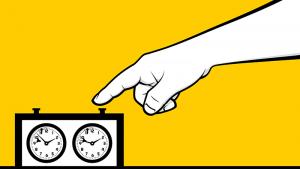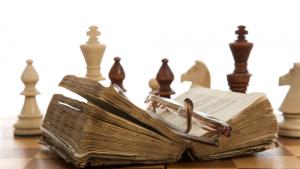
The Chess Investigator: Analyze Your Mistakes
When I reflect on the earliest stages of my chess career, it's not the thrill of victory, the five-foot trophies that I could barely lift from the ground, or even the accolades, certificates and triple-digit rating gains that dominate my recollections. The moments that I remember clearest begin with me flicking over my king, haphazardly signing the scoresheet and sulking away from the board, unable to contain the tears.
Even after a decade and a half, these memories are so fresh that I still experience a surge of pain when I play through some of my earliest recorded losses. Yet there is a good reason that my recollection of defeat is virtually immune to the passage of time: My earliest losses and setbacks were the unsung heroes of my chess development, boosting my chess improvement and strengthening my resolve in unimaginable ways.
The game you are about to see took place on Thursday, June 5, 2003, at the now-defunct Burlingame Chess Club. This unassuming building, located in a quiet town about 20 minutes from downtown San Francisco, played a key role in my early chess development. I played my first rated tournament at the Burlingame Chess Club, and every Thursday night the club regulars gathered for a weekly rated game. With only a few days left in the school year, I arrived at the club fully determined to kick off my summer vacation by crossing 1100.

My opponent that evening was John Lavrentjev, who was a few years older, and with whom I had gone back and forth in previous meetings.
This time, after deftly handling the black side of a Ruy Lopez, John committed a disastrous oversight:
In this position, Black must already exercise a high degree of caution to contain the knight on d5. To this end, either 17...Rc8, covering the c7-square, or the immediate 17...c4 would have maintained reasonable chances. Instead, John decided that it would be prudent to undermine the irksome knight with 17...f5.
This move hardly requires further commentary. I immediately slammed my knight onto c7 (which is a mistake, as we shall see), and a devastated John missed the only chance to complicate matters with ...c5-c4, submissively sliding and giving away an entire rook. And so, after 18.Nc7+ Kh8 19.Nxa8, I began to count the seconds until my opponent would flick over his king.
Instead, John took a deep breath and played on. A few moves later, I started to get nervous. Why wasn't he resigning? I was up a full rook, and there was not any counterplay in sight. Yet I couldn't decide the best way to actually reel in the point.
Time pressure set in, and then—boom!—I placed my knight en prise. And after that...well, I better stop talking, because the rest of the game has to be seen to be believed.
If memory serves me right, there was a brief window in which the pure shock of defeat dominated all other emotions. And then the sadness and disbelief set in. The sobbing, as my parents confirm, continued for several hours.
Neither masochistic tendencies nor misplaced nostalgia motivated the decision to discuss this game. Rather, I chose to recount this incident because my loss to John taught me that the most important technique of chess improvement is a player's ability to reflect on and extract lessons from his or her own losses and mistakes.
Looking back, I realize that Caissa actually offered me a bargain on that Thursday evening. A few hours of pain and a handful of rating points are a small price to pay for a lesson that revealed my greatest weakness and set me on the path to rapid improvement. Both as a player and as a coach, I am routinely inspired by the incredible effect that proper self-reflection can have on the arc of a player's improvement.
This column represents my attempt to demonstrate the power of meditating on and learning from one's own mistakes. Using my own chess growth as a kind of prototype, and drawing upon my experience coaching players of various levels, each article will be dedicated to a particular type of mistake that players in a certain rating range are prone to making. Starting from the beginner rank, we will tackle the underlying reasons behind the debilitating plateaus and inexplicable slumps that players experience at each level of chess mastery.

Before the road to chess mastery is fully paved, we must first return to the tragic game that I shared at the beginning of the article. "What exactly," you may wonder, "did this game teach me?"
There were three invaluable lessons from my loss to John Lavrentjev that I immediately put to good use:
- I realized that I needed to deal with my glaring incompetence in converting big material advantages, a problem that plagues a great majority of players in that rating range.
- I learned a crucial early lesson in the power of resilience. While I previously understood this, belief in the power of resourcefulness quickly became a cornerstone of my chess development.
- Later, I experienced the sweet nectar that sober self-reflection can bring.
My technique in this game was far from perfect. In fact, I've included in my commentary to this game a kind of riddle—at one point in my annotations, I deliberately left out a chance that my opponent had to complicate the game. Show me your keen eye in the comments section!
I was very happy that I managed to keep my composure and refrain from panicking when my opponent displayed tenacity. My weakness was far from eradicated, and it would take many more years before I was fully competent in converting completely winning material advantages. Even now, I consider my technique to be far inferior to that of my fellow grandmasters.
It is a fact of life that we can never be perfect at any area of the game. Furthermore, as you progress through the ranks, what was once your greatest strength can become your greatest weakness, and vice-versa. Style and preferences, contrary to popular belief, are impermanent.
Analyzing your own mistakes is the only tool in a player's arsenal that is guaranteed to improve your play every time.






